…and Uphold the Principles of Productive Work and Economic Freedom
Socialism puts everybody equal, treats everybody the same regardless of your skill, regardless of how hard you work. You reward the incompetent, you penalize the overprotective. But the free market system that came out of the Bible says, you know what? If you produce a lot you should get a lot, if you’re lazy you shouldn’t get anything, and that gives you an incentive to be a good producer.
—David Barton—
“Ditching Socialism in the New World: A Lesson for 21st-Century Americans,” is a paraphrase of Plymouth Governor William Bradford’s account of the Pilgrims’ failed 2-year experiment in socialism and is available here.
Key point: Exodus 20:15, Exodus 20:17, Ephesians 4:28, and 2 Thessalonians 3:10 are four of many passages destroying socialism and upholding the tenets of free enterprise. Even so, if these four verses contained all Scripture said about economic systems, socialism still wouldn’t have a leg on which to stand. If a Christian sincerely believes the Bible, he or she cannot embrace socialism.
An abbreviated version of this article is available online here, and in the form of PDF file here.
Many Christians today are confused about socialism. Increasingly, especially among the young and among those without a biblical worldview, self-professed believers are looking at socialism favorably. Yet, despite the compassionate-sounding, feel-good rhetoric mouthed by socialism’s proponents, its track record is abysmal. In fact, it couldn’t be worse! Historian Lee Edwards writes, socialism
has never succeeded anywhere, including the Marxism-Leninism of the Soviet Union, the National Socialism of Nazi Germany, the Maoism of Communist China, the Chavez-Maduro socialism of Venezuela. It has never come close anywhere to Marx’s ideal of a classless society.
Dr. Edwards goes on to briefly discuss three additional ways socialism has failed — and not just marginally, either — totally. First, Marx was wrong about all of his predictions regarding society, class divisions, and poverty and wealth. Second, Karl Marx was abysmally wrong about humanity and human nature. Finally, Marx was wrong when he emphasized that socialism would give power to the people. Instead, socialist states, without exception, have been and are run by the tyrannical elite.
Socialism in the Early Church?

I recently heard someone say that socialism is history’s most popular bad idea. The myths and the propaganda surrounding this ideology make it extremely attractive. It has tremendous emotional appeal. Further, adding to the confusion (and it is confusion) is the reality that leftist political and religious leaders continually seek to convince Christians that the early church practiced socialism. US Senator Raphael Warnock is one example.
We’ve dealt with this question extensively at Word Foundations, so we’ll only summarize it briefly here. Here’s the reality: The very Bible passages proponents of socialism cite to try to convince people the early church practiced this ideology do not teach socialism at all. Instead, they uphold principles of economic responsibility and freedom. As you have time and opportunity, please read these two articles. They introduce readers to solid reasons socialism is not a biblical idea.
In this post, I want to examine four Bible verses (two from the Old Testament and two from the New Testament) to show just how clearly and strongly, even with just these verses, the Bible teaches both personal responsibility and personal freedom in the economic realm. We’ll mention other Bible passages along the way, including in some cases the verses surrounding the ones on which we’re focusing. Still, we’ll emphasize four. Some overlap with our Thanksgiving Bible study will occur, but I believe this article will mine additional gems of truth and insight. While the emotional vibes might not be as warm as they are with socialism, Christians recognize that what sounds good or what feels good doesn’t necessarily accomplish or further what truly is good. In the Bible, it’s clear that personal freedom within the limits of God’s law truly is good.
What sounds good or what feels good doesn’t necessarily accomplish or further what truly is good.
Private Property and Property Rights are Linchpin Issues
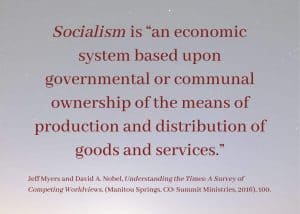 Before turning to the Scripture, it’s important to understand that a basic difference between socialism and a free-market economy is this: Socialism is a system without property rights. Everything is held collectively. Worldview experts Jeff Myers and David A. Noebel define socialism as “an economic system based upon governmental or communal ownership of the means of production and distribution of goods and services.”
Before turning to the Scripture, it’s important to understand that a basic difference between socialism and a free-market economy is this: Socialism is a system without property rights. Everything is held collectively. Worldview experts Jeff Myers and David A. Noebel define socialism as “an economic system based upon governmental or communal ownership of the means of production and distribution of goods and services.”
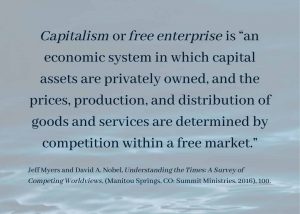 Myers and Noebel further define capitalism or free enterprise as “an economic system in which capital assets are privately owned, and the prices, production, and distribution of goods and services are determined by competition within a free market.”
Myers and Noebel further define capitalism or free enterprise as “an economic system in which capital assets are privately owned, and the prices, production, and distribution of goods and services are determined by competition within a free market.”
It’s quite clear, then, that in the debate over socialism and free enterprise, property and property rights are linchpin issues. You can’t have socialism without private property and property rights, and you can’t have capitalism without them. This is one reason why the current talk about “owning nothing and being happy” should send chills down our spines! Note that Karl Marx himself made these three statements:
-
-
-
- My object in life is to dethrone God and destroy capitalism.
- The theory of Communism may be summed up in one sentence: Abolish all private property.
- Communism begins where atheism begins.
-
-
 So we see that property and property rights are linchpin issues. Without them, the wheels would fall off the wagon of free enterprise.
So we see that property and property rights are linchpin issues. Without them, the wheels would fall off the wagon of free enterprise.
With this in mind, let’s open our Bibles. Again, we will look at four passages in this article, but please understand at the outset that these four Scripture portions are only four of many that we could cite. These four, however, are particularly significant.
First, from the Old Testament: Exodus 20:15 — “You shall not steal”
Exodus 20:15 showcases the Eighth Commandment, as does Deuteronomy 5:19. These verses tell us forthrightly, “You shall not steal.” What is stealing? It is taking something that does not belong to you but to someone else. It is swiping from another that which he or she rightfully owns. Dennis Prager notes that this commandment is open-ended. Whereas the Fifth Commandment tells us to honor our parents, and the Sixth Commandment forbids murder, or, put another way, one’s taking the life of an innocent man or woman, boy or girl, the Eighth Commandment “doesn’t even hint at what it is we are forbidden to steal. It means we cannot take anything that belongs to another person.”1

It’s vital that we understand at this point that the Ten Commandments aren’t just a list of moral and ethical responsibilities, although they are that. Simultaneously, they also are a list of inherent, God-given rights.
-
-
-
- God’s command that individuals honor their parents necessarily means that parents have a right to respect and honor from their children.
- The Lord’s prohibition of murder in the Sixth Commandment means, and must mean, that every human being has a right to life.
- The Lord’s prohibition against lying in the Ninth Commandment means people have a right not to be slandered. In other words, they have a right to their own reputations.
-
-
Furthermore, the Eighth Commandment against stealing means people have a right to personal property, to ownership of tangible assets. Prager continues, stating that
the most obvious meaning of the Eighth Command is a prohibition against stealing property — and that, in turn, means God sanctifies personal property. Just as we are forbidden to steal people, we are forbidden to steal what people own.
God sanctifies personal property.
—Dennis Prager—
It has been shown over and over that private property, beginning with land ownership, is indispensable to creating a free and decent society. Virtually all tyrannies, especially totalitarian regimes, take away private property rights. And in the ancient and medieval worlds, almost no one had property rights: a few rich people owned all the land.
Then, in nineteenth-century Europe, many socialists argued for confiscating private property and giving it to the “people.” Where that advice was followed, in what came to be known as the communist world, theft of property quickly resulted in a total theft of freedom, and ultimately a massive theft of life.2
In communist countries where socialists’ recommendation that private property be confiscated and given to the “people” was followed, “theft of property quickly resulted in a total theft of freedom, and ultimately a massive theft of life.”
—Dennis Prager—

Although most of them made their mark in the world before Karl Marx, America’s Founders and past leaders understood that property rights were among the inherent rights of all persons. Accordingly, they worked to make sure the government they founded would protect such rights — not violate them, even, supposedly, for “the greater good.” Go here to read quotations about property rights from several of America’s Founders, those who influenced them, and several more of her past leaders.
Second, from the Old Testament: Exodus 20:17 — “You shall not covet”
In Exodus 20:17 and Deuteronomy 5:21 we find the Tenth Commandment. These verses tell us not to covet. Stated positively, this commandment means that we are to be content with what we have. This doesn’t preclude a desire to improve one’s lot in life through productive and profitable work, but it does prohibit envy and greed. Exodus 20:17 says,
You shall not covet your neighbor’s house; you shall not covet your neighbor’s wife, nor his male servant, nor his female servant, nor his ox, nor his donkey, nor anything that is your neighbor’s.
Again, we see clearly, and in this case explicitly, property rights emphasized. No less that seven possessive nouns and pronouns are used in this verse.
Moreover, the Tenth Commandment takes property rights to a new level, and to a very specific one, at that. Not only are people to be allowed to own property and to manage it, but their neighbors — their fellow citizens — are commanded to respect those rights of ownership. The Tenth Commandment isn’t primarily about actions, but attitudes.

A word about the ownership of people, or slavery, is in order. In the day the Ten Commandments were given to Moses, people had servants. Even so, the commandment not to covet, with its mention of servants as property, should not be seen as an endorsement of slavery in the sense that we view it today. In the Old Testament slavery was allowed but regulated in important ways. Do not get hung up about the issue of slavery when considering the Tenth Commandment (or the Eighth, either, for that matter). This divine directive is about respecting property rights and being able to exercise them, not about slavery.
Remember that in the debate between socialism and free enterprise, property and property rights are linchpin issues. Taking the Eighth and Tenth Commandments together, it is impossible to conclude that they sanction, or even allow for, collective ownership of property.
In the debate between socialism and free enterprise, property and property rights are linchpin issues.
In fact, because the Eighth and Tenth Commandments forthrightly affirm private ownership and management of property as they do, they simultaneously and forcefully repudiate notions of “socialist style” collective ownership. Stealing or coveting one’s neighbor’s things isn’t possible if he or she doesn’t own them. It’s that simple.
Third, from the New Testament: Ephesians 4:28 — The Christian Alternative to Stealing
In Ephesians 4, the apostle Paul admonished the Ephesian Christians, and he admonishes us, to “put off, concerning your former conduct, the old man which grows corrupt according to the deceitful lusts, and be renewed in the spirit of your mind, and that you put on the new man which was created according to God, in true righteousness and holiness” (see vv. 22-24).
What does this mean in practical terms? While in a few moments we will zero in on verse 28, it is helpful to understand the surrounding context.
-
-
- Liars must quit lying and speak the truth (v. 25).
- Believers must never allow anger to lead them into sin; nor can they surrender any territory to the devil (vv. 26-27).
- Those who have been stealing must stop taking what belongs to another or to others. Instead, they are to work productively, earning their keep and managing their (legitimately acquired) assets well, so that they may have something (a surplus) from which to give to help those who are poor or otherwise disadvantaged (v. 28).
- Christians must replace corrupt and destructive speech with speech that edifies and builds up others, “that it may impart grace to the hearers” (v. 29).
- Believers must take care not to grieve the Holy Spirit with their actions and words. After all, the Holy Spirit “sealed [them] for the day of redemption” (v. 30).
- Christians must abandon resentment, destructive behavior, anger, harsh and violent language, and intent to harm — all of these — and allow God to replace them in their lives with kindness, sensitivity to others, and a willingness to forgive others as Christ has forgiven them (vv. 31-32).
-
In verse 28 Paul writes, “Let him who stole steal no longer, but rather let him labor, working with his hands what is good, that he may have something to give him who has need.” This is an excellent verse to consider after having discussed the prohibitions against stealing and coveting in the Ten Commandments, and after having come to understand how the Eighth and Tenth Commandments, respectively, affirm and uphold property rights.
Just what is the Christian alternative to stealing? Let’s take what we’ve said in item number 3 above and break it down.
-
-
- Those who have been stealing must stop taking what belongs to another or to others.
- Instead, they are to work productively,
- earning their keep and
- managing their (legitimately acquired) assets well,
- so that they may have something (a surplus)
- from which to give to help those who are poor or otherwise disadvantaged (v. 28).
-
Can you think of a plan more lethal to socialism than this? There isn’t one!
-
-
- Private property rights (both individual ownership and individual management of property) are clearly upheld.
- Work for pay is commended. Not only is productivity involved (constructive use of one’s time and energy), but ownership and management of earned income is as well.
- Working to meet one’s own needs is a concept inherently upheld in this verse.
- Responsible stewardship on the individual level also is sanctioned.
- Working to attain property and wealth, and working to increase it, are good. These contribute 1) to one’s own good and (if charity is practiced, as it should be) 2) to the good of others.
- Charity, or giving to help those who are poor and in need, is authorized and commended in Ephesians 4:28.
-
Note carefully some significant things Paul did not say. He did not mention the government here, nor did he speak of centralized planning or a redistribution of assets that resemble any the schemes socialists promote. Instead, the charity commended is of a generous spirit, given freely, according to one’s own choice and out of the goodness of the giver’s own heart.
Again, it is difficult for me to think of a more stinging and thorough rebuke of socialism than this. But the verse we will consider next comes close.
Fourth, from the New Testament: 2 Thessalonians 3:10 — No Mooching
One pastor has titled a study he presents on 2 Thessalonians 3:6-18 a “Warning Against Idleness.” Apparently idleness and sloth had become a problem for some of the Thessalonians believers. Even though it is right for Christians to look forward to and prepare for Christ’s return, it isn’t proper to become focused on it to the point of neglecting ongoing responsibilities. Believing Christ will return any moment, some Christians wondered why they needed to “bother with earthly work. Paul had to tell them that looking forward to Christ’s return does not mean that we detach ourselves from earthly duties.”
Not only did Paul charge his readers to work diligently and productively, but also to disassociate themselves from those who didn’t discipline themselves in these ways. Paul wrote,
6 But we command you, brethren, in the name of our Lord Jesus Christ, that you withdraw from every brother who walks disorderly and not according to the tradition which he received from us. 7 For you yourselves know how you ought to follow us, for we were not disorderly among you; 8 nor did we eat anyone’s bread free of charge, but worked with labor and toil night and day, that we might not be a burden to any of you, 9 not because we do not have authority, but to make ourselves an example of how you should follow us.
10 For even when we were with you, we commanded you this: If anyone will not work, neither shall he eat. 11 For we hear that there are some who walk among you in a disorderly manner, not working at all, but are busybodies. 12 Now those who are such we command and exhort through our Lord Jesus Christ that they work in quietness and eat their own bread.
13 But as for you, brethren, do not grow weary in doing good. 14 And if anyone does not obey our word in this epistle, note that person and do not keep company with him, that he may be ashamed. 15 Yet do not count him as an enemy, but admonish him as a brother (3:6-15).
“From each according to his ability, to each according to his needs,” said Karl Marx. This socialist principle promotes the notion of “equal outcomes.” It’s a mantra among social justice crusaders as well, and not accidentally, because the social justice movement is rooted in Marxism. Yet, if those who don’t work receive the same as those who do, how is this a just society? It isn’t. It can’t be! It won’t be a productive society, either. Before long, everyone will refuse to work.
Upholding true justice, Paul had a policy by which he operated when he lived and ministered among the Thessalonians. We read of it in verse 10: “For even when we were with you, we commanded you this: If anyone will not work, neither shall he eat.”
But isn’t this harsh? Isn’t it cruel? Keep in mind that Paul was not saying that those who cannot work should be denied food. They really do need charity and other assistance, and rendering them these is consistent with Christianity and biblical teachings. However, those who “will not work” ought to be denied food. Paul was right!
You see, socialism, which doesn’t work and never will work, cannot work because it removes all incentives to engage in productive, constructive labor. Capitalism or free enterprise has incentives built-in. When we allow those to operate, the lazy become productive. Creativity and ingenuity arise within workers. Satisfaction results from what otherwise would be seen as only grueling and empty toil. Do you know someone who is willfully undisciplined? He or she won’t remain that way if the apostle Paul’s policy of work and rewards is put in place and judiciously enforced.
In the context of the debate between socialism and free enterprise, here’s the bottom line on 2 Thessalonians 3:10: Paul’s policy not only repudiates socialism; it also validates free-market principles and incentives.
In Summary
Let’s review. Remember that socialism can’t exist with property rights, and free enterprise can’t exist without them. Here are four verses that destroy socialism and uphold free enterprise.
-
-
- First, the Eighth Commandment forbids theft. Without property rights, including property ownership, theft cannot occur. Thus, Exodus 20:15 assumes the validity and reality of private property ownership.
- Second, the prohibition in Exodus 20:17 against coveting means we are to respect property rights, not merely tolerate them. Here, socialism takes another hit!
- Third, Ephesians 4:28 says the thief should stop stealing and instead should work, first to meet his own needs, but also to earn enough to assist those really needing help. Work, pay, exercising responsibility over oneself and one’s assets, and practicing charity — all of these — are inconsistent with socialism’s realities but align well with free-market principles in both theory and practice.
- Fourth, 2 Thessalonians 3:10 validates the legitimacy of rewards and consequences that align with quality and quantity of an individual’s productive work. This also deals a blow to socialism and upholds a free-market approach.
-
Don’t be fooled. These verses are just four out of many in Scripture that affirm individual freedoms, responsibilities, incentives, and opportunities to prosper economically. At the same time, they also point to a system that allows people to honor God with their property and wealth.
Can we put it another way? Yes! The free enterprise economic model aligns with biblical teachings…
…and socialism absolutely does not.
Copyright © 2021 by B. Nathaniel Sullivan. All rights reserved.
Unless otherwise indicated, Scripture has been taken from the New King James Version®. Copyright © 1982 by Thomas Nelson, Inc. Used by permission. All rights reserved.
top image credit: Photo by Egor Myznik on Unsplash
1Dennis Prager, Exodus: God, Slavery, and Freedom — The Rational Bible, (Washington, DC: Regnery Faith, 2018), 265.
2Prager, 265-266.


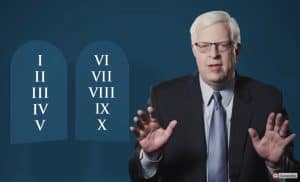
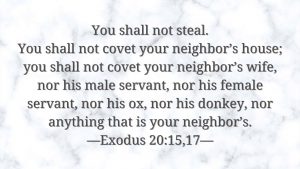
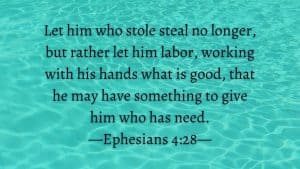

Excellent and needed article. I think many honest Christians have a wrong idea about socialism and Marxism. This article is a great way to help them to open their eyes. There are many living examples today to see the result of this very wrong philosophy and ideology.
Thank you, Oscar! I appreciate your own stand against socialism as well!
This is misinformation about socialism. Socialism is when communally we own the means of production like you said not the elite class and politicians like you describe. That’s the opposite of socialism. Socialism is not stealing because it’s based on consent through democracy and the social contract. A socialist society gives the most power to the average individual to have a say on how society functions not the 1% or the elite.
Also in the new testament the early christians share things communally and give to the poor similar to how a socialist society would provide a safety net you can build up from.
Also, socialism still allows for personal property which are things like your house, car, clothes, entertainment devices, etc. Things you own that aren’t used for the means of production like land and factories used for labor or resources.
Thank you, Hudson, for your comments. Respectfully, I couldn’t disagree with you more strongly. You contend that “socialism still allows for [some] personal property” items. But Karl Marx said, “The theory of Communism may be summed up in one sentence: Abolish all private property.” The word *all* is important in Marx’s statement. “Oh, that’s communism,” you might object. Consider also that Vladimir Linen said, “The goal of socialism is communism.” While a socialist society is perhaps one in which individuals “own” a few possessions because the society can’t function without allowing them to in the practical world, central planning still is theft by the government elites because it robs workers of real wealth and the opportunity to build real wealth. How does it do this? Keep reading!
Even though you believe that “a socialist society gives the most power to the average individual to have a say on how society functions not the 1% or the elite,” the practical reality is that centralized planning *does not* give the average individual a say, but only the elite. Workers are allowed to work only for the state, not afforded opportunities to be productive themselves and build their own wealth (resources from which they can help the poor voluntarily, and possibly offer jobs to others). Under socialism, the one working harder and longer than others isn’t compensated more than those working less; instead he or she is penalized because government elites compensate all workers equally. The resulting scenario kills workers’ incentive to be creative and productive, so they slack off and simply look to the state to supply their needs. See https://wordfoundations.com/unjust/ I would ask you, “How would you feel if you were a worker in this scenario who saw a fellow worker receive 4.5 bushels of wheat for which he did not not work? Would you continue putting forth your best efforts for the “collective,” knowing that other workers who are slacking off will benefit from your work when they didn’t deserve it — and you won’t even though you *do* deserve it? I don’t think so.
In the early church, private property rights are explicitly affirmed in Acts 5:1-11. Peter’s words to Ananias in verse 4 demonstrate this. These principles also applied in Acts 2:40-47; 4:32-37. In other words, members of the early church gave to meet other members’ needs voluntarily. Their approach dod not involve the government. This makes what the early church did in Acts 2 and 4 technically not socialism, but it is noteworthy that the system they tried actually didn’t work and the approach was not repeated. In fact, In Acts 6, jealously and misunderstandings arose between widows over distribution of resources. These problems may have arisen from the approach taken in Acts 2 and 4. I am not saying that generosity and charity were not needed or that the early church stopped practicing these altogether. I *am* saying that compassion/charity and socialism are very different. In fact, they are opposites.
I would encourage you to read this series, which dives even more deeply into the Bible’s perspective on property, wealth, and economic systems.https://discoverbedrocktruth.org/thebibleandeconomicfreedom/
Again, thank you for reading and for offering your feedback. Blessings to you!
B. Nathaniel Sullivan